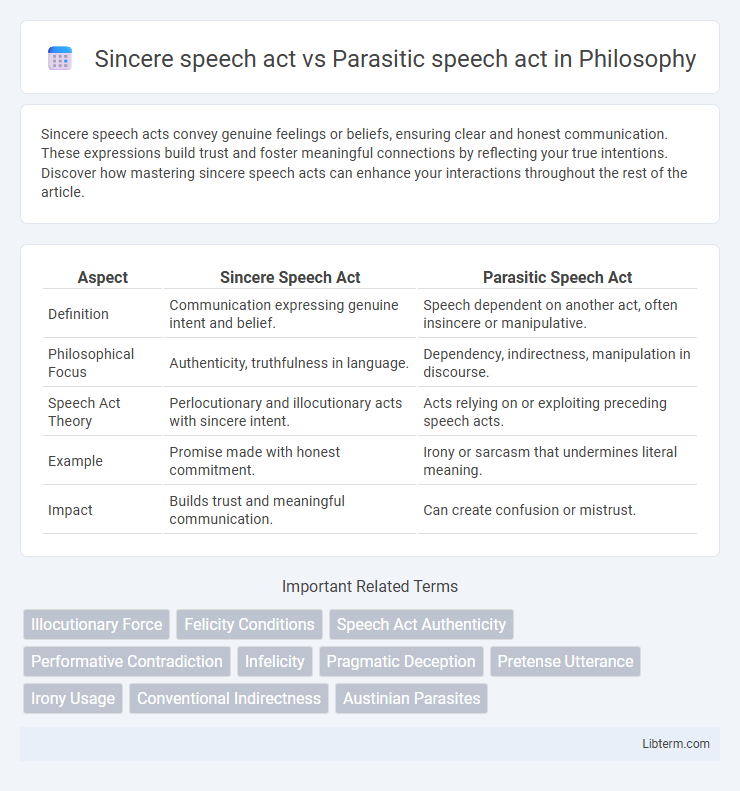Sincere speech acts convey genuine feelings or beliefs, ensuring clear and honest communication. These expressions build trust and foster meaningful connections by reflecting your true intentions. Discover how mastering sincere speech acts can enhance your interactions throughout the rest of the article.
Table of Comparison
| Aspect | Sincere Speech Act | Parasitic Speech Act |
|---|---|---|
| Definition | Communication expressing genuine intent and belief. | Speech dependent on another act, often insincere or manipulative. |
| Philosophical Focus | Authenticity, truthfulness in language. | Dependency, indirectness, manipulation in discourse. |
| Speech Act Theory | Perlocutionary and illocutionary acts with sincere intent. | Acts relying on or exploiting preceding speech acts. |
| Example | Promise made with honest commitment. | Irony or sarcasm that undermines literal meaning. |
| Impact | Builds trust and meaningful communication. | Can create confusion or mistrust. |
Introduction to Speech Acts
Sincere speech acts convey a speaker's genuine intention, aligning words with true beliefs or desires, such as promising or apologizing with authentic commitment. Parasitic speech acts depend on underlying sincere acts to function, often modifying or commenting on the original speech without conveying independent illocutionary force. Understanding this distinction is essential in speech act theory, which explores how utterances perform actions beyond mere information exchange.
Defining Sincere Speech Acts
Sincere speech acts occur when the speaker genuinely intends to convey their true beliefs, feelings, or intentions, aligning their utterance with internal mental states. These acts include promises, assertions, and apologies, which depend on the speaker's honesty and commitment to the propositional content. In contrast, parasitic speech acts exploit existing communicative contexts without the speaker's genuine engagement or sincerity, often relying on others' prior contributions.
Characteristics of Parasitic Speech Acts
Parasitic speech acts are characterized by their reliance on the pragmatic force of a preceding sincere speech act to achieve communicative effects without intending to fulfill the conventional illocutionary force themselves. They often function to echo, reinforce, or exploit the original utterance's speech act, lacking autonomous force but deriving significance through their dependency. Unlike sincere speech acts that convey direct communicative intentions, parasitic speech acts manipulate context and speaker intent subtly, often producing indirect or secondary meanings.
Key Differences Between Sincere and Parasitic Speech Acts
Sincere speech acts are characterized by genuine intent, where the speaker's expression aligns with their true beliefs and feelings, ensuring honest communication. Parasitic speech acts, however, rely on the context of prior utterances or responses, lacking autonomous communicative content and often serving to manipulate or exploit conversational norms. The key differences lie in the authenticity of intent, dependence on preceding discourse, and the functional role within the interaction.
Philosophical Foundations: Austin and Searle
John L. Austin introduced the concept of speech acts emphasizing the performative nature of language, distinguishing sincere speech acts where the speaker genuinely intends the illocutionary act from parasitic speech acts that derive meaning contextually without genuine intent. John Searle expanded Austin's framework by categorizing speech acts into assertives, directives, commissives, expressives, and declarations, focusing on the speaker's sincerity conditions for successful communication. Both philosophers underline the importance of speaker intention and context in determining the authenticity and effectiveness of speech acts within communicative interactions.
Examples of Sincere Speech Acts in Everyday Language
Sincere speech acts include promises, apologies, and compliments, where the speaker genuinely intends to fulfill the statement's commitment or express true feelings. For example, saying "I will call you tomorrow" as a promise, or "I'm sorry for being late" as an apology, demonstrates authenticity in communication. Compliments like "You did a great job" reflect an honest appreciation, showcasing the speaker's sincere intent in everyday language.
Common Types of Parasitic Speech Acts
Common types of parasitic speech acts include interruptions, digressions, and redundant comments that detract from the primary conversation. These acts often serve no genuine communicative purpose and instead distract or derail meaningful dialogue. Unlike sincere speech acts that convey clear intent, parasitic speech acts exploit conversational norms without contributing to mutual understanding.
Linguistic Implications and Social Consequences
Sincere speech acts, characterized by genuine intent aligning with the speaker's beliefs, foster trust and effective communication within social interactions, reinforcing cooperative social norms. Parasitic speech acts, which manipulate or exploit conversational contexts for personal gain without genuine commitment to the content, can lead to misunderstandings, erosion of trust, and social alienation. Linguistically, sincere acts contribute to the pragmatic coherence of discourse, while parasitic acts disrupt communicative intentions and social harmony, impacting language use in social networks and community dynamics.
Sincerity Conditions and Their Violations
Sincere speech acts fulfill sincerity conditions by genuinely reflecting the speaker's beliefs, intentions, or feelings, ensuring authentic communication. In contrast, parasitic speech acts violate these conditions by exploiting the formal structure of communication without the corresponding genuine mental state, often leading to deception or insincerity. This violation undermines the cooperative principle in conversation and can result in misunderstandings or a breakdown of trust between interlocutors.
The Role of Context in Interpreting Speech Acts
The role of context in interpreting speech acts distinguishes sincere speech acts, which align with the speaker's genuine intent and social norms, from parasitic speech acts, which depend on prior conversational cues or other utterances for meaning. Contextual factors such as speaker intention, previous discourse, and the situational environment are crucial in determining whether a speech act is processed as authentic or parasitic. Understanding this interaction enhances pragmatic analysis and aids in accurate communication interpretation.
Sincere speech act Infographic

 libterm.com
libterm.com